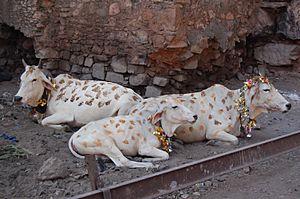Sacred cow facts for kids
Sacred cow is an idiom. An idiom is a phrase that means something different from the words themselves. When someone says "sacred cow," they are not talking about a real cow or religion.
This expression means a person, idea, or belief that has been respected for a very long time. People might be afraid or unwilling to criticize or question it. It's like it's too special to be touched!
The idea behind this idiom comes from the great respect shown to cows in Hinduism. The phrase "sacred cow" probably started in America in the early 1900s. You might also hear "holy cow!" as an expression of surprise, which is similar.
A real 'sacred cow' or 'sacred bull' is an actual animal. These animals are treated with deep respect in certain religions and during special celebrations. For example, in Hinduism, many people do not eat cow meat because cows are considered sacred.
Cows in Hinduism
In Hinduism, cows are seen as very special and deeply respected animals. They are often thought of as a 'caregiver' or a mother figure. One Hindu goddess, Bhoomi, who represents the Earth, is often shown as a cow.
Most Hindu people respect cows for their gentle nature. Cows also represent strength and goodness. Many Hindus who eat meat will still choose not to eat beef.
There is a festival called "Mattupongal" in India. This festival is part of the larger Pongal celebration. During Mattupongal, people thank cows for their help with farming. It's a way to show gratitude for all the work cows do for farmers.
Honoring Cows

In Hindu traditions, cows are honored in many ways. They are given special food and decorated with garlands at festivals across India. One such event is the annual Gopastami festival, which is dedicated to Krishna and cows.
The gentle nature of cows is also shown through Kamadhenu. She is a goddess believed to be the mother of all cows. In India, there are more than 3,000 places called Gaushalas. These places are like special homes where old and sick cows are cared for.
India has the largest number of cows in the world, with about 44.9 million. While some old cows find care in Gaushalas, others are sometimes left in public places like train stations or markets.
Honoring cows helps people learn to be gentle and feel connected to nature. Cows provide many useful things. They give us milk and cream, yogurt and cheese, butter and ghee. Cow's milk is believed to make a person better. Ghee, which is clarified butter from cow's milk, is used in religious ceremonies and to prepare special foods. Even cow dung is used as fertilizer, as fuel, and to clean homes.
Related pages
 | DeHart Hubbard |
 | Wilma Rudolph |
 | Jesse Owens |
 | Jackie Joyner-Kersee |
 | Major Taylor |

